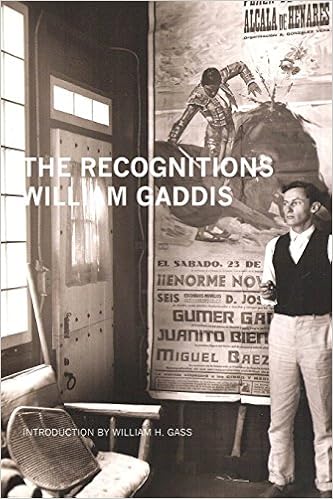
Some reviewers take M. Gaddis to task for his erudition, his inclusion of people speaking foreign languages, his inclusion of esoteric learning, his difficulty, and, perhaps inevitably, his prententiousness. These same reviewers are perhaps unaware that all artists in all fields are, by very nature, pretentious. Joyce and Proust and Faulkner could be poster boys for it. When people write that it bothers them that an author employs words from other languages, it smacks of chauvinism and provincialism. Thomas Mann hurls French about in "The Magic Mountain" with gleeful (if Mann can ever be called such) abandon. Is Melville showing off his learning by writing interminable chapters on whaling - it is all so much blubber. Gaddis also has the unmitigated gall to be difficult. Hey guys, so is life - and this novel is brimming with life in all its many guises, its many joys, its many sorrows.
This book is a masterpiece - able to stand tall next to any novel published in any language in its century. The prose is elegant and vulgar by turns - Gaddis' ear for dialogue, his eye for the telling detail that can describe a person in a beautifully turned phrase, his sardonic wit, his encyclopedic knowledge are here on display serving universal themes (I will not mention them here as one can find them in many of the other reviews), issues that are as relevant today (if not more so) than they were in '55. As for criticism of its length - that it has "too many pages" - it may well be true. It is then in good company indeed as it is also true of "Ulysses," "In Search of Lost Time," "Bleak House," "Middlemarch," and "Brothers Karamazov" to name but a few. The books here named also have their moments of tedium, points at which the reader is tempted to skip a few pages (with Proust this can amount to fifteen or so at a time). These novels, like "The Recognitions" rise above their flaws. Looking for a flawless novel? You may as well look for a unicorn. Poems might be flawless, plays might be structured perfectly - but novels? They, more than plays and poems convey life at its messiest, its most ridiculous. I love Henry James, but when he railed against "loose, baggy monsters" his critical acumen obviously deserted him. Gaddis risked quite a lot in publishing this text. The flaws therin do not take away from its being a masterpiece of ingenuity. The party scenes alone demonstrate his ability to get inside disparate heads and hearts, to see the sublime as well as the absurd, the spiritual as well as the carnal. Flaubert himself would envy Gaddis' ability to come up with the right word in the right place. In the 19th century readers loved that the novels were thick "triple deckers," it is a sad state of affairs when a novel can be slighted merely because of its length. Oh and it is one of the funniest books it has ever been my pleasure to read. For those of you unsure whether the book is worth the time and effort required - it most definitely is!!!!
No comments:
Post a Comment